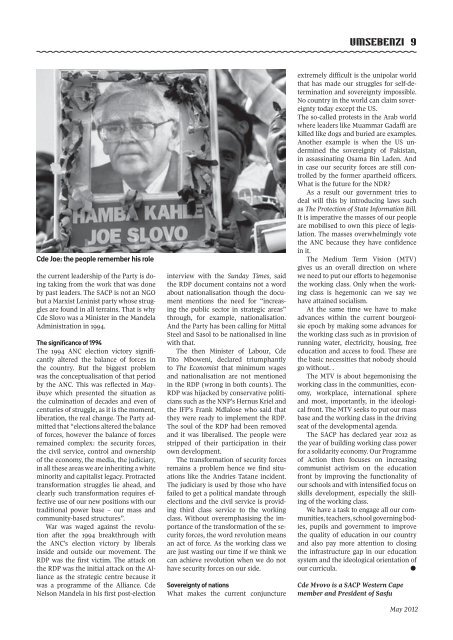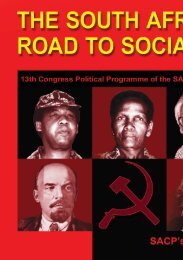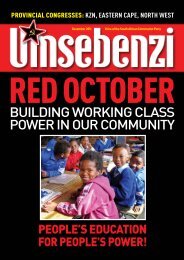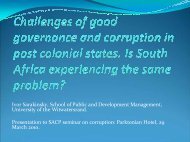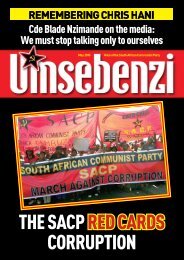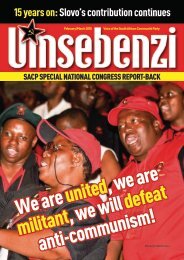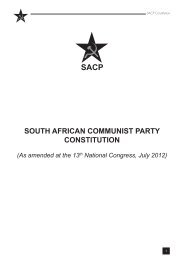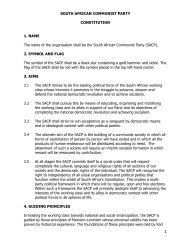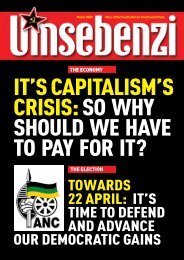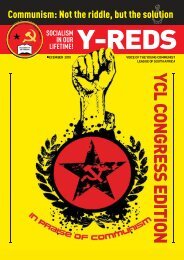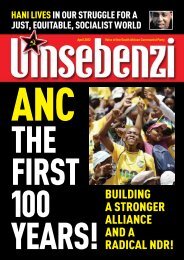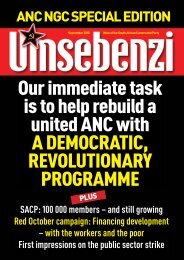A sea of red - South African Communist Party
A sea of red - South African Communist Party
A sea of red - South African Communist Party
Create successful ePaper yourself
Turn your PDF publications into a flip-book with our unique Google optimized e-Paper software.
Cde Joe: the people remember his role<br />
the current leadership <strong>of</strong> the <strong>Party</strong> is doing<br />
taking from the work that was done<br />
by past leaders. The SACP is not an NGO<br />
but a Marxist Leninist party whose struggles<br />
are found in all terrains. That is why<br />
Cde Slovo was a Minister in the Mandela<br />
Administration in 1994.<br />
The significance <strong>of</strong> 1994<br />
The 1994 ANC election victory significantly<br />
alte<strong>red</strong> the balance <strong>of</strong> forces in<br />
the country. But the biggest problem<br />
was the conceptualisation <strong>of</strong> that period<br />
by the ANC. This was reflected in Mayibuye<br />
which presented the situation as<br />
the culmination <strong>of</strong> decades and even <strong>of</strong><br />
centuries <strong>of</strong> struggle, as it is the moment,<br />
liberation, the real change. The <strong>Party</strong> admitted<br />
that “elections alte<strong>red</strong> the balance<br />
<strong>of</strong> forces, however the balance <strong>of</strong> forces<br />
remained complex: the security forces,<br />
the civil service, control and ownership<br />
<strong>of</strong> the economy, the media, the judiciary,<br />
in all these areas we are inheriting a white<br />
minority and capitalist legacy. Protracted<br />
transformation struggles lie ahead, and<br />
clearly such transformation requires effective<br />
use <strong>of</strong> our new positions with our<br />
traditional power base – our mass and<br />
community-based structures”.<br />
War was waged against the revolution<br />
after the 1994 breakthrough with<br />
the ANC’s election victory by liberals<br />
inside and outside our movement. The<br />
RDP was the first victim. The attack on<br />
the RDP was the initial attack on the Alliance<br />
as the strategic centre because it<br />
was a programme <strong>of</strong> the Alliance. Cde<br />
Nelson Mandela in his first post-election<br />
interview with the Sunday Times, said<br />
the RDP document contains not a word<br />
about nationalisation though the document<br />
mentions the need for “increasing<br />
the public sector in strategic areas”<br />
through, for example, nationalisation.<br />
And the <strong>Party</strong> has been calling for Mittal<br />
Steel and Sasol to be nationalised in line<br />
with that.<br />
The then Minister <strong>of</strong> Labour, Cde<br />
Tito Mboweni, decla<strong>red</strong> triumphantly<br />
to The Economist that minimum wages<br />
and nationalisation are not mentioned<br />
in the RDP (wrong in both counts). The<br />
RDP was hijacked by conservative politicians<br />
such as the NNP’s Hernus Kriel and<br />
the IFP’s Frank Mdlalose who said that<br />
they were ready to implement the RDP.<br />
The soul <strong>of</strong> the RDP had been removed<br />
and it was liberalised. The people were<br />
stripped <strong>of</strong> their participation in their<br />
own development.<br />
The transformation <strong>of</strong> security forces<br />
remains a problem hence we find situations<br />
like the Andries Tatane incident.<br />
The judiciary is used by those who have<br />
failed to get a political mandate through<br />
elections and the civil service is providing<br />
third class service to the working<br />
class. Without overemphasising the importance<br />
<strong>of</strong> the transformation <strong>of</strong> the security<br />
forces, the word revolution means<br />
an act <strong>of</strong> force. As the working class we<br />
are just wasting our time if we think we<br />
can achieve revolution when we do not<br />
have security forces on our side.<br />
Sovereignty <strong>of</strong> nations<br />
What makes the current conjuncture<br />
extremely difficult is the unipolar world<br />
that has made our struggles for self-determination<br />
and sovereignty impossible.<br />
No country in the world can claim sovereignty<br />
today except the US.<br />
The so-called protests in the Arab world<br />
where leaders like Muammar Gadaffi are<br />
killed like dogs and buried are examples.<br />
Another example is when the US undermined<br />
the sovereignty <strong>of</strong> Pakistan,<br />
in assassinating Osama Bin Laden. And<br />
in case our security forces are still controlled<br />
by the former apartheid <strong>of</strong>ficers.<br />
What is the future for the NDR?<br />
As a result our government tries to<br />
deal will this by introducing laws such<br />
as The Protection <strong>of</strong> State Information Bill.<br />
It is imperative the masses <strong>of</strong> our people<br />
are mobilised to own this piece <strong>of</strong> legislation.<br />
The masses overwhelmingly vote<br />
the ANC because they have confidence<br />
in it.<br />
The Medium Term Vision (MTV)<br />
gives us an overall direction on where<br />
we need to put our efforts to hegemonise<br />
the working class. Only when the working<br />
class is hegemonic can we say we<br />
have attained socialism.<br />
At the same time we have to make<br />
advances within the current bourgeoisie<br />
epoch by making some advances for<br />
the working class such as in provision <strong>of</strong><br />
running water, electricity, housing, free<br />
education and access to food. These are<br />
the basic necessities that nobody should<br />
go without. .<br />
The MTV is about hegemonising the<br />
working class in the communities, economy,<br />
workplace, international sphere<br />
and most, importantly, in the ideological<br />
front. The MTV seeks to put our mass<br />
base and the working class in the driving<br />
<strong>sea</strong>t <strong>of</strong> the developmental agenda.<br />
The SACP has decla<strong>red</strong> year 2012 as<br />
the year <strong>of</strong> building working class power<br />
for a solidarity economy. Our Programme<br />
<strong>of</strong> Action then focuses on increasing<br />
communist activism on the education<br />
front by improving the functionality <strong>of</strong><br />
our schools and with intensified focus on<br />
skills development, especially the skilling<br />
<strong>of</strong> the working class.<br />
We have a task to engage all our communities,<br />
teachers, school governing bodies,<br />
pupils and government to improve<br />
the quality <strong>of</strong> education in our country<br />
and also pay more attention to closing<br />
the infrastructure gap in our education<br />
system and the ideological orientation <strong>of</strong><br />
our curricula.<br />
<br />
Cde Mvovo is a SACP Western Cape<br />
member and President <strong>of</strong> Sasfu<br />
May 2012


